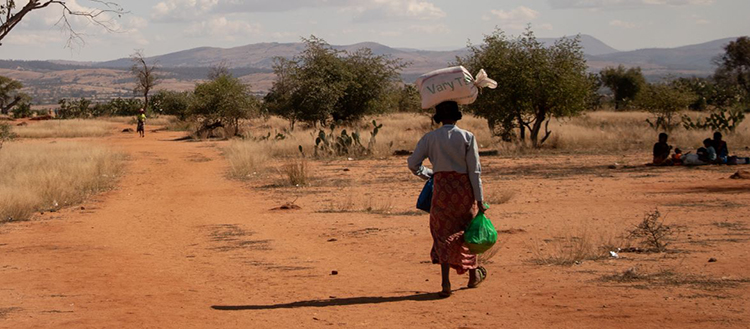GHF: global health in times of environmental emergency
How to limit the risks of pandemics caused by the destruction of ecosystems? The 9th edition of the Geneva Health Forum will explore the public health issues that affect the whole planet.

By affecting water resources and agriculture, climate change stimulates migration phenomena. © Solene Mourlon
Back in face-to-face format and in videoconference, the Geneva Health Forum will take place from May 3 to 5 at the Geneva International Conference Center (CICG). Organized by the University of Geneva (UNIGE) and the Geneva University Hospitals (HUG), this 9th edition will focus on the consequences of environmental changes on the health of the planet’s inhabitants such as the transmission of certain viruses (Covid 19, Ebola, for example) from animals to humans, facilitated by the destruction of ecosystems. The program includes dialogue, debates and the presentation of a hundred innovative solutions to some major challenges of global health. More than 400 speakers and 2000 participants from 80 different countries are expected.
Learning from the Covid-19 crisis and better understanding the impact of environmental degradation on our health, speaking out against all attacks on the health system and populations around the world: with these subjects, the Geneva Health Forum (GHF) is at the heart of current events. This 9th edition, entitled “Covid-19 pandemic and environmental emergency: reinventing global health in times of global changes”, will take place from May 3 to 5 at the Geneva International Conference Center (CICG).
Organized by the University of Geneva (UNIGE) and the Geneva University Hospitals (HUG), the event will bring together experts to find concrete solutions according to the “One Health” or “Planetary Health” principles, which are based on a systemic and integrated approach to public, animal and environmental health. Nearly 400 speakers and 2000 participants from 80 different countries are expected.
“Although the Covid 19 pandemic is not yet behind us, we felt it was important to address broader issues related to environmental degradation and its impact on our health,” explains Dr. Eric Comte, scientific director of the GHF at the Institute of Global Health of the Faculty of Medicine of the UNIGE.
Constraints, pollution and climate change
The constraints on the animal and plant world - such as the decline in biodiversity, the scarcity of agricultural land, the industrialization of agriculture and livestock - are increasingly responsible for pandemics. Pollution is directly responsible for an increasing number of pathologies and deaths. Climate change creates more and more difficult humanitarian contexts and stimulates migration by affecting agriculture and water resources.
“The purpose of the GHF is to bring together scientists, private and institutional actors as well as international organizations and NGOs to discuss these complex global health issues. Thanks to its location, Geneva is the ideal place to initiate this dialogue in an efficient and open manner”, explains Prof. Antoine Flahault, Director of the Institute of Global Health of the Faculty of Medicine of the UNIGE and co-President of the Geneva Health Forum.
Dialogue and innovation
More than twenty sessions are scheduled as well as workshops and debates. All plenary sessions will be offered in a hybrid format (face-to-face and online). Key sessions include “One Health: Is there a paradigm shift?” scheduled for Tuesday, May 3. Another major theme will be the International treaty on pandemic prevention and preparedness. A space for discussion on the issues of this «convention» on the agenda of the next World Health Assembly will take place on Wednesday May 4.
The Global Health Lab, an innovation fair co-organized with twenty incubators, will display this year more than 100 innovations. “Start-ups will present products that are in development or recently introduced on the market. It is also an opportunity for students and pupils from our engineering schools in Switzerland to present their projects”, explains Eric Comte. Among the innovations on display will be new digital platforms for storing medical data, an application dedicated to advance directives, machines for treating infectious risk waste, environmentally friendly masks and a biosecure emergency room.
The “Grand Jet d’Or de Genève” prize - in partnership with the AXA Research Fund - will be awarded by an independent selection committee and the GHF 2022 Partners Program Committee. The prize of 50 000 francs will be awarded to a research team for an innovative project in the field of global health. Note that the Global Health Lab will also be showcased in a virtual version.
Preview: “The Factory of Pandemics”
A highly anticipated documentary is also on display: “La fabrique des pandémies” by director Marie Monique Robin with the collaboration of French actress Juliette Binoche. Premiering at the GHF on Wednesday, May 4 at 6pm, it features the actress’ meeting with twenty scientists who detail their global vision of the actions to be taken at the local, national and international levels to fight against zoonoses, those diseases transmitted to humans by animals. This documentary will be broadcast on May 22, on the occasion of the International Day for Biological Diversity on 30 television channels, including RTS.
Find the complete program here.
The Geneva Health Forum (GHF)
The Geneva Health Forum (GHF) is the forum that brings together key actors of global health. Created in 2006, it is organized by the Geneva University Hospitals (HUG) and the University of Geneva in partnership with 30 global multisectoral organizations, with the overall goal to contribute to improving health and care access in the world. At the heart of International Geneva, the Geneva Health Forum provides a continuous platform for collaboration and holds one of the largest Global Health conferences every two years. The next GHF conference is taking place from 3 to 5 May 2022, under the theme: “Covid-19 Pandemic and Environmental Emergency: Reinventing Global Health in times of Global Changes”.
3 May 2022